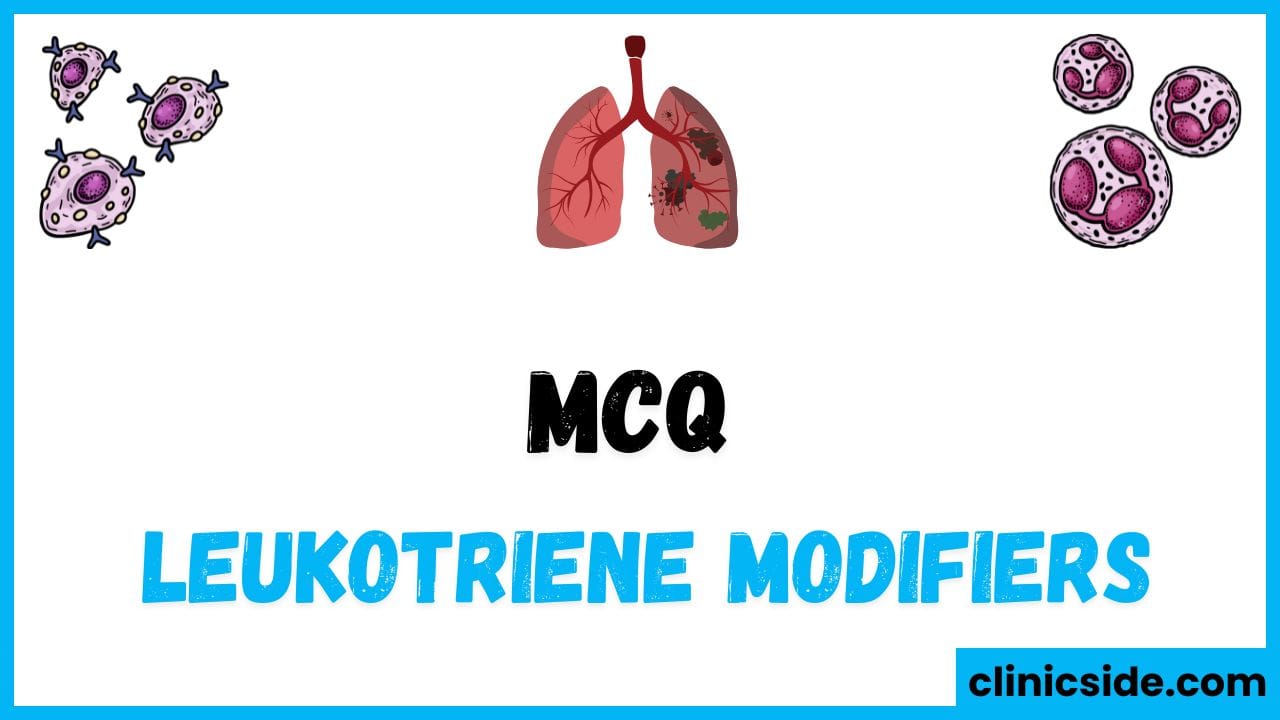Quiz
Available options: 1 to 20
Summary of MCQs on Leukotriene Modifiers
Leukotriene modifiers are a group of medications used primarily for controlling asthma and chronic obstructive pulmonary disease (COPD). These drugs, which include leukotriene receptor antagonists (LTRAs) and 5-lipoxygenase inhibitors, help by blocking the action of leukotrienes, inflammatory molecules that contribute to airway narrowing and inflammation. Below is a summary of key points about leukotriene modifiers, derived from multiple-choice questions (MCQs) on their use.
How Leukotriene Modifiers Work
Leukotriene modifiers block the activity of leukotrienes, which are chemicals involved in inflammation and bronchoconstriction. Leukotrienes are known to tighten the airways, increase mucus production, and cause inflammation. Leukotriene receptor antagonists, such as montelukast and zafirlukast, prevent leukotrienes from attaching to their receptors, thus reducing inflammation. On the other hand, zileuton, a 5-lipoxygenase inhibitor, prevents the formation of leukotrienes by blocking the enzyme responsible for their production.
Primary Uses of Leukotriene Modifiers
These medications are mainly prescribed for long-term control of asthma and to prevent exercise-induced bronchoconstriction. Montelukast is also commonly used to treat allergic rhinitis. Zileuton is specifically indicated for long-term management of asthma symptoms. Leukotriene modifiers are frequently used in combination with inhaled corticosteroids for better asthma control, particularly in patients who need additional symptom management.
Common Side Effects
The most frequently reported side effects of leukotriene modifiers include nausea, headaches, and gastrointestinal discomfort. Zileuton may cause liver problems, which makes it unsuitable for patients with liver disease. Zafirlukast also carries a risk of liver toxicity. Despite these potential risks, leukotriene modifiers generally have fewer systemic side effects compared to inhaled corticosteroids, making them a favorable option for some individuals.
Leukotriene Receptor Antagonists vs. Inhaled Corticosteroids
Leukotriene receptor antagonists like montelukast are generally taken orally, offering convenience for patients who struggle with inhalers. Additionally, these drugs tend to have fewer systemic side effects, such as the oral thrush and hoarseness that are associated with inhaled corticosteroids. However, inhaled corticosteroids are often preferred as first-line treatment, especially during acute asthma flare-ups, due to their potent anti-inflammatory effects.
Contraindications
Leukotriene modifiers should be avoided in patients with liver disease. Zileuton, in particular, is contraindicated in individuals with liver dysfunction because of the risk of liver toxicity. Similarly, zafirlukast should not be prescribed to patients with hepatic impairment. Patients taking these medications should be monitored regularly to detect any potential adverse effects related to liver function.
Effect on Bronchoconstriction
Leukotrienes are major contributors to bronchoconstriction, the narrowing of airways that makes breathing difficult in asthma and COPD. Leukotriene modifiers help by blocking the action of leukotrienes, thus preventing bronchoconstriction and improving airflow. They are not meant for immediate relief but are effective in managing long-term symptoms, reducing the frequency of asthma attacks and preventing exercise-induced bronchospasm.
Combination Therapy
Leukotriene modifiers are often combined with inhaled corticosteroids in asthma treatment plans. This combination provides more comprehensive control of airway inflammation, enhancing overall asthma management. Beta-agonists may also be used in combination with leukotriene modifiers to further improve bronchodilation and help with acute symptoms, although leukotriene modifiers are not typically used for immediate relief of asthma symptoms.
Advantages Over Other Medications
Leukotriene receptor antagonists offer the advantage of oral administration, making them a convenient option for patients who may have trouble using inhalers. These drugs also have fewer systemic side effects compared to inhaled corticosteroids, which can cause issues like oral infections and hoarseness. While inhaled corticosteroids are essential for acute symptom relief, leukotriene modifiers play an important role in the long-term management of asthma.
Leukotriene Modifiers in COPD
Though primarily used in asthma management, leukotriene modifiers may also benefit individuals with COPD. Like asthma, COPD involves inflammation and bronchoconstriction in the airways. Leukotriene modifiers can help reduce these symptoms in COPD patients. However, they are typically not used as first-line treatments for COPD, instead being part of an adjunctive therapy plan that includes bronchodilators and corticosteroids.
Conclusion
Leukotriene modifiers are vital for managing asthma and COPD, particularly for long-term symptom control. By blocking leukotrienes, these medications reduce inflammation and bronchoconstriction, which helps prevent asthma attacks and improve respiratory function. Though they come with some risks, especially for individuals with liver disease, their benefits in managing chronic symptoms, combined with their fewer systemic side effects, make them a valuable treatment option. Leukotriene modifiers are often used in combination with other medications, such as inhaled corticosteroids, for enhanced asthma control.





